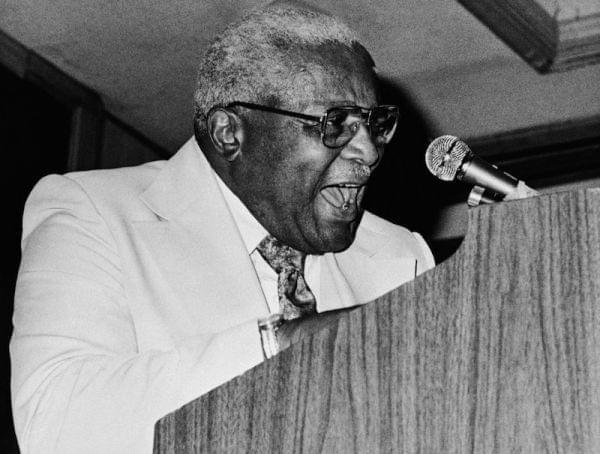From The Archives: In U Of I Speech, Martin Luther King, Sr. Remembers Son

The Rev. Martin Luther King Sr. in Macon, Georgia at the State Sunday School and Baptist Congress on July 20, 1977. (AP Photo)
In observance of Martin Luther King, Jr. Day, Illinois Public Media takes you back to a speech given by the father of the slain civil rights leader.
On April 12, 1975, Martin Luther King, Sr. visited the University of Illinois at Urbana-Champaign to discuss the role of religion in the Civil Rights Movement, and his son’s tireless work.
Dr. Martin Luther King Jr., was assassinated in Memphis in 1968 by James Earl Ray.
His father, who was active in the Civil Rights Movement and worked as a baptist minister, said he bears no ill will for his son's killer.
"Yes, I would have much preferred that Martin Luther King could have kept going on across the world, preaching the gospel of love," King, Sr. said. “I am determined that I’m not going to let nothing get me down. I’m determined that I’m not going to let hate take me over and destroy me."
King, Sr. said he never accepted segregation or the idea that anyone was better than him simply because of his skin color. He added that he fought the system and his son went along with that idea, and that as a child, King, Jr. told his mother that he would fight segregation until the bitter end.
“He did so much about it in such a short while. He made true his statement,” said King, Sr, who called his son a “genius.”
He added that King, Jr. said racists did not need punishment, but rather they needed help.
During his speech, King, Sr. also talked about his wife, Albert King, who died in 1974, less than a year before his visit to the U of I. She was killed after a man entered a church service and shot her.
"I do not hate the man who came into our church, and took the life of my dear wife," he said. "I'm not bitter against him. I am every man's brother."
The speech concluded with King, Sr. singing "We Shall Overcome," as his audience followed him along.
He died in 1984 at the age of 84. Coincidentally, this year would have been Martin Luther King, Jr.'s 84th birthday.

